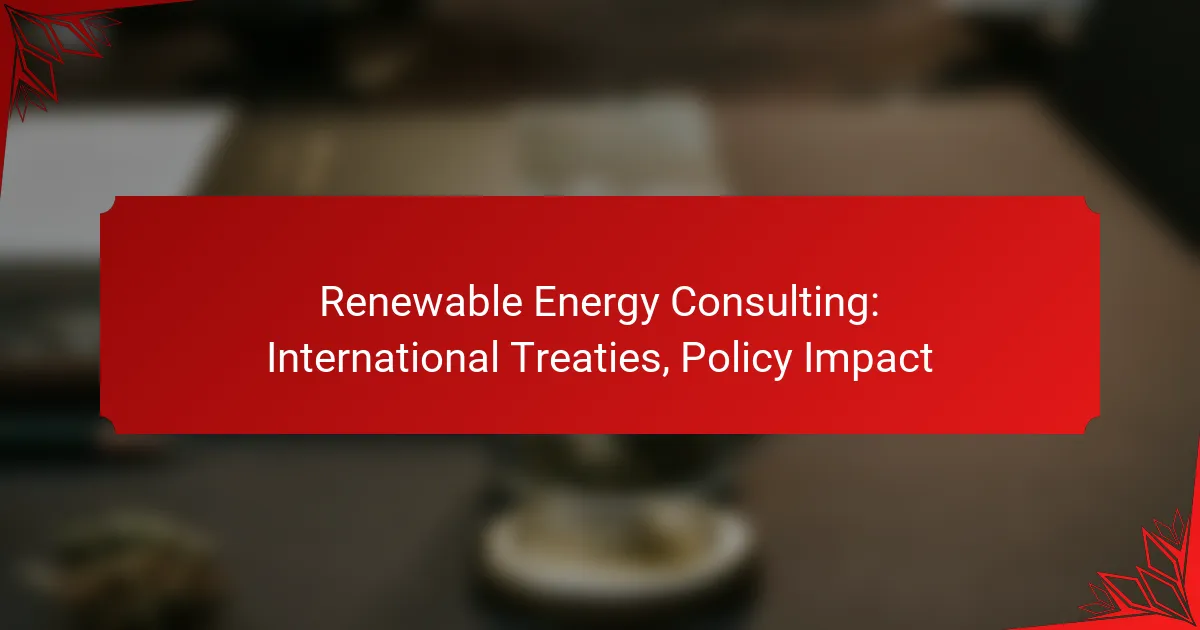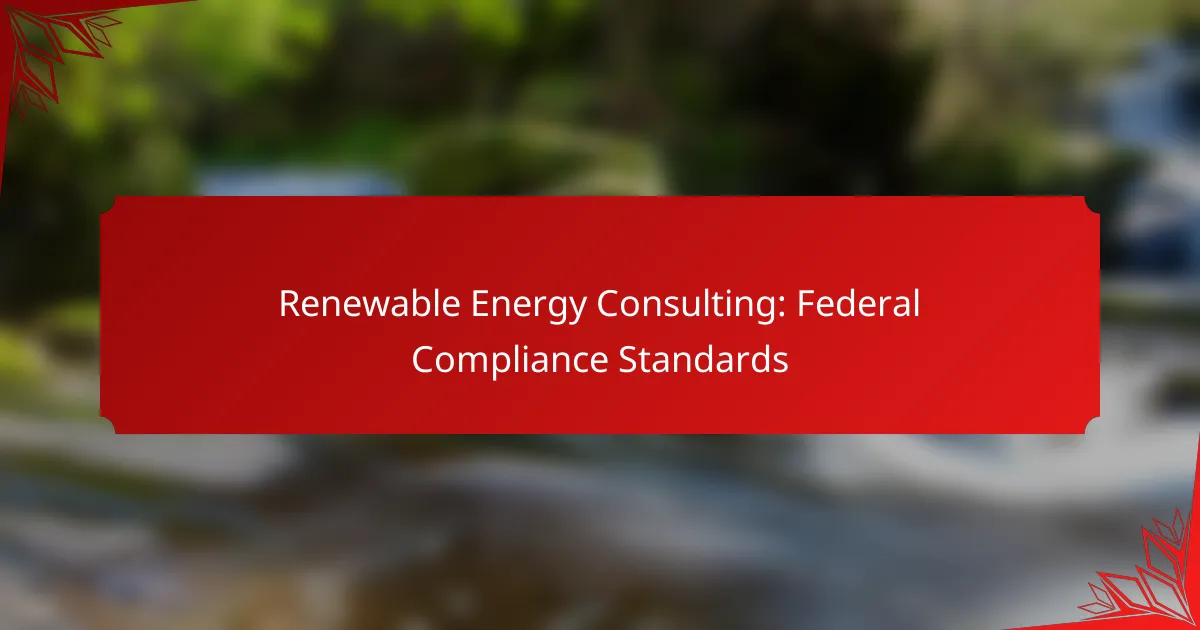International treaties play a crucial role in shaping renewable energy policies by fostering cooperation and setting regulatory standards among nations. These agreements not only encourage commitments to reduce carbon emissions but also guide investment and legislative actions in sustainable energy. Leading consulting firms in the renewable energy sector offer essential expertise to help clients navigate these complex frameworks and optimize their projects for success.
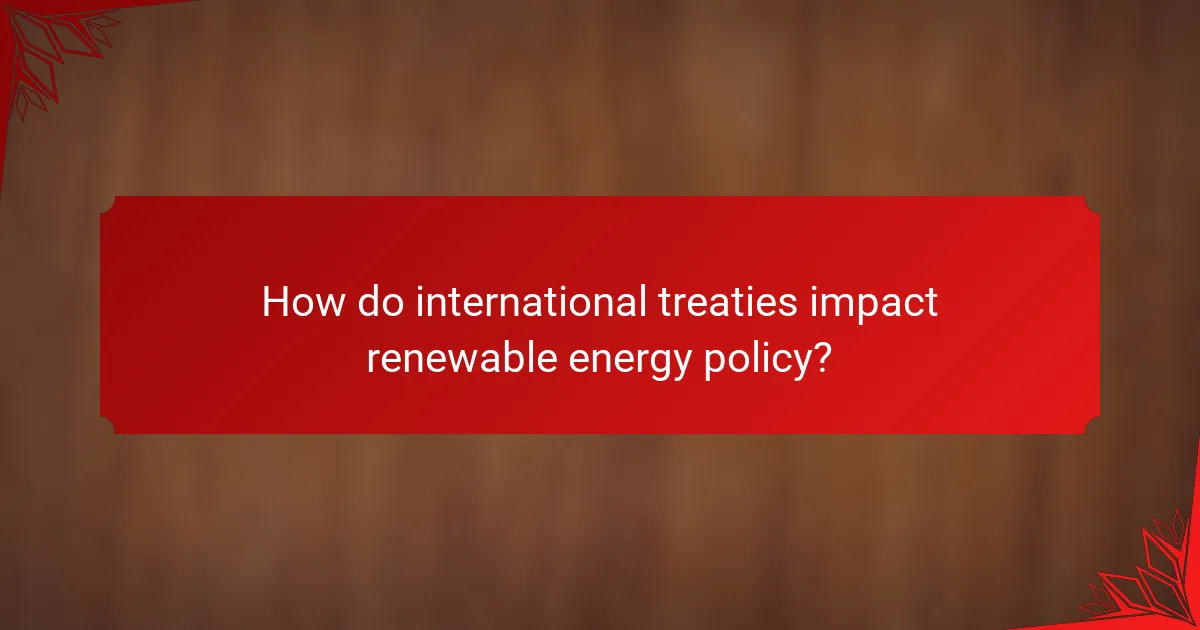
How do international treaties impact renewable energy policy?
International treaties significantly shape renewable energy policy by establishing frameworks for cooperation, funding, and regulatory standards among countries. These agreements often drive national commitments to reduce carbon emissions and promote sustainable energy sources, influencing both legislative and investment decisions.
Key treaties influencing global renewable energy
Several key treaties play a pivotal role in shaping renewable energy initiatives worldwide. The Paris Agreement, for example, sets binding commitments for countries to limit global warming, encouraging investments in renewable technologies. Additionally, the United Nations Framework Convention on Climate Change (UNFCCC) provides a platform for ongoing negotiations and updates to climate action strategies.
Other significant agreements include the Kyoto Protocol, which established legally binding obligations for developed countries to reduce greenhouse gas emissions, and the Energy Charter Treaty, which promotes energy cooperation among member states. These treaties collectively create a robust framework for advancing renewable energy policies globally.
Effects on national energy policies
International treaties compel nations to align their energy policies with global sustainability goals. Countries often revise their energy strategies to meet treaty obligations, resulting in increased investments in renewable energy sources like solar, wind, and hydroelectric power. For instance, many European Union member states have adopted ambitious renewable energy targets in response to EU directives.
Moreover, treaties can lead to the adoption of specific regulations and incentives, such as feed-in tariffs or renewable energy certificates, which encourage the development of clean energy projects. However, the effectiveness of these policies can vary based on national priorities and economic conditions.
Case studies of treaty implementation
One notable case is Germany’s Energiewende, or “energy transition,” which has been significantly influenced by the EU’s climate policies and the Paris Agreement. Germany has committed to phasing out nuclear energy and increasing its reliance on renewables, resulting in substantial growth in solar and wind energy production.
Another example is Costa Rica, which has leveraged international commitments to achieve nearly 100% renewable energy generation. The country’s adherence to the Paris Agreement has spurred investments in hydroelectric, wind, and solar projects, showcasing how treaty obligations can lead to transformative national energy policies.

What are the leading renewable energy consulting firms?
Leading renewable energy consulting firms provide expert guidance on sustainable energy solutions, policy frameworks, and project implementation. These firms help clients navigate the complexities of the renewable energy landscape, ensuring compliance with regulations and optimizing project outcomes.
Top firms in North America
In North America, several firms stand out for their expertise in renewable energy consulting. Companies like Black & Veatch and DNV GL are recognized for their comprehensive services, including feasibility studies, regulatory compliance, and project management. They cater to a wide range of clients, from government agencies to private sector developers.
Another notable player is IEEFA, which focuses on market analysis and policy advocacy, helping clients understand the financial implications of renewable energy investments. Their insights are crucial for navigating the evolving energy market in the U.S. and Canada.
Notable firms in Europe
Europe hosts several prominent renewable energy consulting firms that are shaping the industry. Ecofys, part of the Navigant group, offers strategic advice on energy transition and sustainability, emphasizing the importance of policy alignment and market readiness. Their expertise is particularly valuable in countries with ambitious renewable energy targets.
Another key player is Ramboll, which provides engineering and consulting services across various sectors, including wind and solar energy. Their multidisciplinary approach allows them to address complex challenges in project development and implementation.
Emerging firms in Asia
In Asia, the renewable energy consulting sector is rapidly evolving, with several emerging firms gaining traction. Gensol Group in India focuses on solar energy consulting, offering services from project design to financing solutions. Their local expertise is essential for navigating India’s regulatory landscape and market dynamics.
Another noteworthy firm is Solar Philippines, which is making strides in solar project development and consulting. They emphasize community engagement and sustainability, aligning with the growing demand for renewable energy solutions across the region.

How to choose a renewable energy consultant?
Choosing a renewable energy consultant involves evaluating their expertise, experience, and alignment with your specific project needs. A well-selected consultant can significantly influence the success of your renewable energy initiatives.
Criteria for selection
When selecting a renewable energy consultant, consider their track record in similar projects, industry certifications, and familiarity with local regulations. Look for consultants who have successfully completed projects in your region, as they will understand the nuances of local policies and incentives.
Evaluate their technical expertise in the specific renewable energy technologies relevant to your project, such as solar, wind, or bioenergy. A consultant with a diverse portfolio can provide insights into best practices and innovative solutions.
Questions to ask potential consultants
Start by asking about their previous projects and the outcomes achieved. Inquire about specific challenges they faced and how they overcame them, as this can reveal their problem-solving capabilities and adaptability.
Additionally, ask about their approach to project management and communication. Understanding how they plan to keep you informed and involved throughout the process is crucial for a successful partnership.
Finally, discuss their fee structure and any potential additional costs. Clarity on pricing will help you avoid unexpected expenses and ensure that their services align with your budget.

What are the benefits of renewable energy consulting?
Renewable energy consulting offers numerous advantages, including cost savings, expert insights, and support for regulatory compliance. By leveraging specialized knowledge, organizations can enhance their energy efficiency and navigate the complexities of energy policies and regulations.
Cost savings through efficiency
One of the primary benefits of renewable energy consulting is the potential for significant cost savings through improved efficiency. Consultants can identify areas where energy consumption can be reduced, leading to lower utility bills and operational costs.
For instance, implementing energy-efficient technologies can result in savings of 20-30% on energy expenses. Additionally, renewable energy sources, such as solar and wind, often have lower long-term costs compared to traditional fossil fuels.
Access to expert knowledge
Renewable energy consultants bring specialized expertise that can be invaluable for organizations looking to transition to sustainable energy solutions. Their knowledge encompasses the latest technologies, market trends, and best practices in the renewable sector.
Consultants can provide tailored recommendations based on an organization’s specific needs, helping to optimize energy strategies and investments. This access to expert knowledge can significantly enhance decision-making and project outcomes.
Regulatory compliance support
Navigating the regulatory landscape is a critical aspect of renewable energy projects. Consultants can assist organizations in understanding and complying with local, national, and international regulations related to renewable energy use and emissions standards.
For example, in the European Union, compliance with the Renewable Energy Directive is essential for organizations aiming to meet sustainability goals. Consultants can help ensure that projects align with these regulations, minimizing the risk of penalties and enhancing eligibility for incentives.
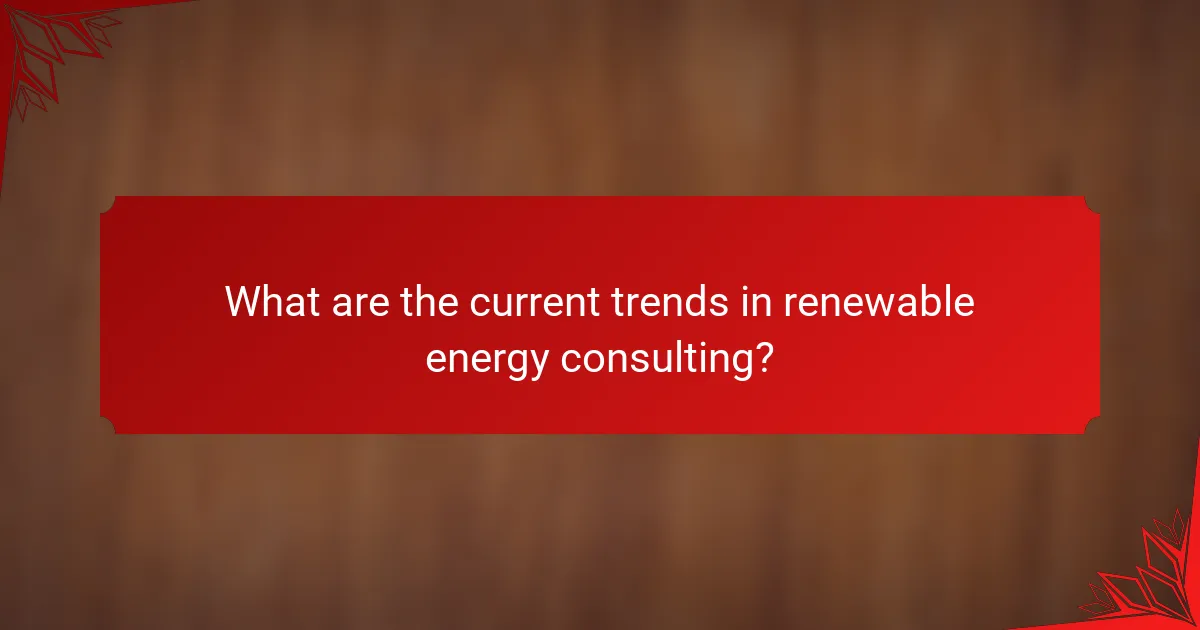
What are the current trends in renewable energy consulting?
Current trends in renewable energy consulting focus on sustainability, technological innovation, and regulatory compliance. Consultants are increasingly guiding organizations in adopting green practices, leveraging advanced technologies, and navigating international treaties to enhance their energy strategies.
Growth of sustainability consulting
Sustainability consulting is experiencing significant growth as businesses recognize the importance of environmental responsibility. Companies are seeking expert guidance to develop sustainable practices that not only reduce their carbon footprint but also improve their market competitiveness.
Consultants often assist organizations in implementing sustainability frameworks, such as the Global Reporting Initiative (GRI) or the Carbon Disclosure Project (CDP). These frameworks help businesses measure and report their environmental impact, which is becoming a critical factor for investors and consumers alike.
Technological advancements in energy solutions
Technological advancements are transforming renewable energy solutions, making them more efficient and accessible. Innovations in solar, wind, and energy storage technologies are enabling organizations to optimize their energy use and reduce costs.
For example, the integration of smart grid technology allows for better energy management and distribution, while advancements in battery storage are improving the viability of renewable sources. Companies are encouraged to stay updated on these technologies to leverage potential cost savings and enhance their energy strategies.
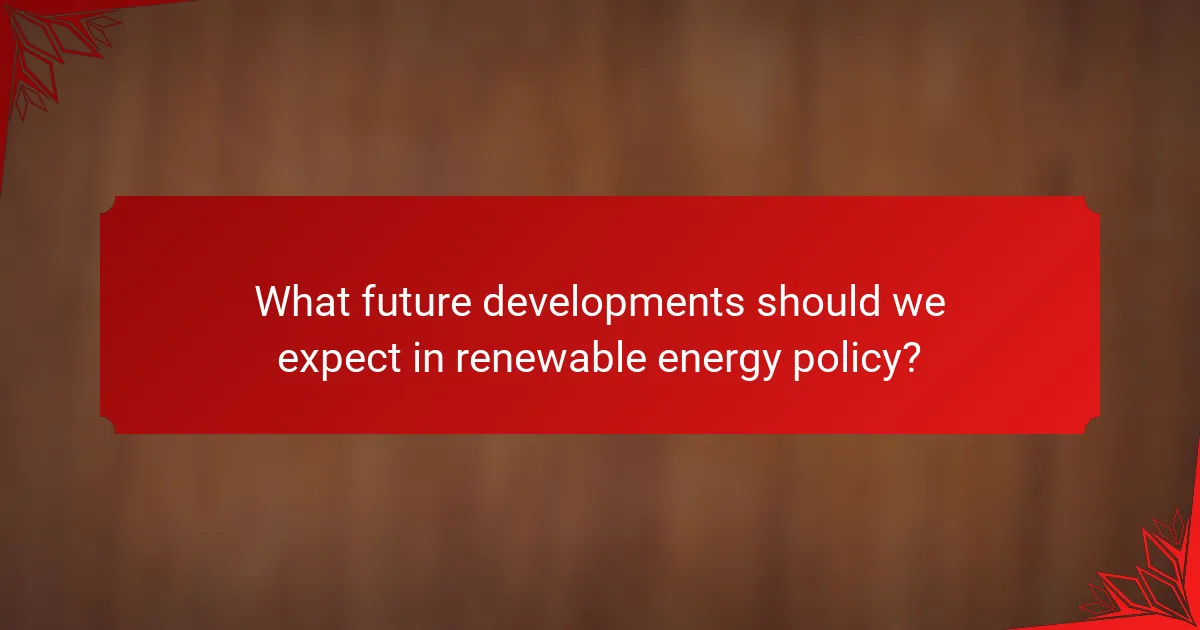
What future developments should we expect in renewable energy policy?
Future developments in renewable energy policy will likely focus on enhancing international cooperation, setting stricter emissions targets, and promoting innovative technologies. Policymakers are expected to prioritize sustainability and resilience in energy systems, responding to climate change and energy security challenges.
Emerging international agreements
Emerging international agreements are shaping the future landscape of renewable energy policy. These agreements aim to unify countries in their efforts to reduce greenhouse gas emissions and promote sustainable energy practices. Notable examples include the Paris Agreement, which sets ambitious targets for limiting global warming, and various regional accords that encourage renewable energy investments.
Countries are increasingly committing to net-zero emissions by mid-century, which requires substantial policy shifts and investment in renewable technologies. For instance, the European Union has proposed the European Green Deal, aiming to make Europe the first climate-neutral continent by 2050. This includes significant funding for renewable energy projects and infrastructure.
Stakeholders should monitor these agreements closely, as they can influence national policies and investment opportunities. Engaging with local governments and international organizations can provide insights into upcoming regulations and funding mechanisms that support renewable energy initiatives.
